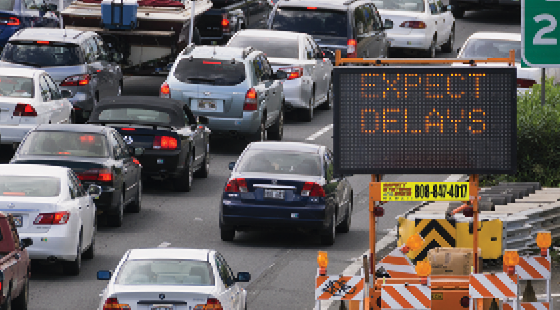
California Chamber of Commerce President and CEO Allan Zaremberg joined Governor Edmund G. Brown Jr. and legislative leaders this week at a State Capitol news conference announcing a landmark transportation investment to fix roads, freeways and bridges across California and put more dollars toward transit and safety.
“Our transportation infrastructure is critical to California’s economy,” said Zaremberg. “The California Chamber of Commerce supports new revenue to repair and maintain our roads and bridges and to reduce traffic congestion. Every day, California drivers spend too many hours in choking traffic on deteriorating roads, while businesses face increased costs and falling productivity from congested highways.
“Raising additional revenues for transportation will not be an easy vote when the time comes, but doing nothing will only ensure deterioration in the system necessary to move people and goods. We look forward to our partnership with the Governor and the Legislature on this important issue as we work toward a comprehensive solution.”
Accountability Provisions
According to the Governor’s news release, the $5 billion-a-year program will cost most drivers less than $10 a month and comes with strict new accountability provisions to ensure funds can be spent only on transportation.
In addition, the Governor’s news release provided the following information:
California has not increased the gas tax in 23 years. Since then, California’s population has grown by 8 million, with millions more cars and trucks on state roads. Californians also drive more than 350 billion miles a year—more than any other state—yet road and transit investments have not kept pace with this growth.
Each California driver spends approximately $700 per year in extra vehicle repairs caused by rough roads. If California does not make investments to fix the roads now, it will cost eight times more to replace later.
Legislation
The legislation, the Road Repair and Accountability Act of 2017, SB 1 (Beall; D-San Jose), invests $52.4 billion over the next decade, split equally between state and local investments:
Fix Local Streets and Transportation Infrastructure (50%):
• $15 billion in “Fix-It-First” local road repairs, including fixing potholes;
• $7.5 billion to improve local public transportation;
• $2 billion to support local “self-help” communities that are making their own investments in transportation improvements;
• $1 billion to improve infrastructure that promotes walking and bicycling;
• $825 million for the State Transportation Improvement Program local contribution;
• $250 million in local transportation planning grants.
Fix State Highways and Transportation Infrastructure (50%):
• $15 billion in “Fix-it-First” highway repairs, including smoother pavement;
• $4 billion in bridge and culvert repairs;
• $3 billion to improve trade corridors;
• $2.5 billion to reduce congestion on major commute corridors;
• $1.4 billion in other transportation investments, including $275 million for highway and intercity-transit improvements.
Ensure Taxpayer Dollars Are Spent Properly with Strong Accountability Measures:
• Constitutional amendment to prohibit spending the funds on anything but transportation.
• Inspector General to ensure Caltrans and any entities receiving state transportation funds spend taxpayer dollars efficiently, effectively and in compliance with state and federal requirements.
• Provision that empowers the California Transportation Commission to hold state and local government accountable for making the transportation improvements they commit to delivering.
• Authorization for the California Transportation Commission to review and allocate Caltrans funding and staffing for highway maintenance to ensure those levels are reasonable and responsible.
• Authorization for Caltrans to complete earlier mitigation of environmental impacts from construction, a policy that will reduce costs and delays while protecting natural resources.
Guided by the principles set forth by President Ronald Reagan when he increased the federal gas tax in 1982, this transportation investment package is funded by everyone who uses state roads and highways:
• $24.4 billion by increasing gasoline excise tax 12 cents;
• $16.3 billion from an annual transportation improvement fee based on a vehicle’s value;
• $7.3 billion by increasing diesel excise tax 20 cents;.
• $3.5 billion by increasing diesel sales tax to 5.75%;
• $200 million from an annual $100 Zero Emission Vehicle fee starting in 2020;
• $706 million in General Fund loan repayments.
Leadership in both the Senate and the Assembly expect the measure to be voted on by Thursday, April 6, according to the Governor’s news release.

